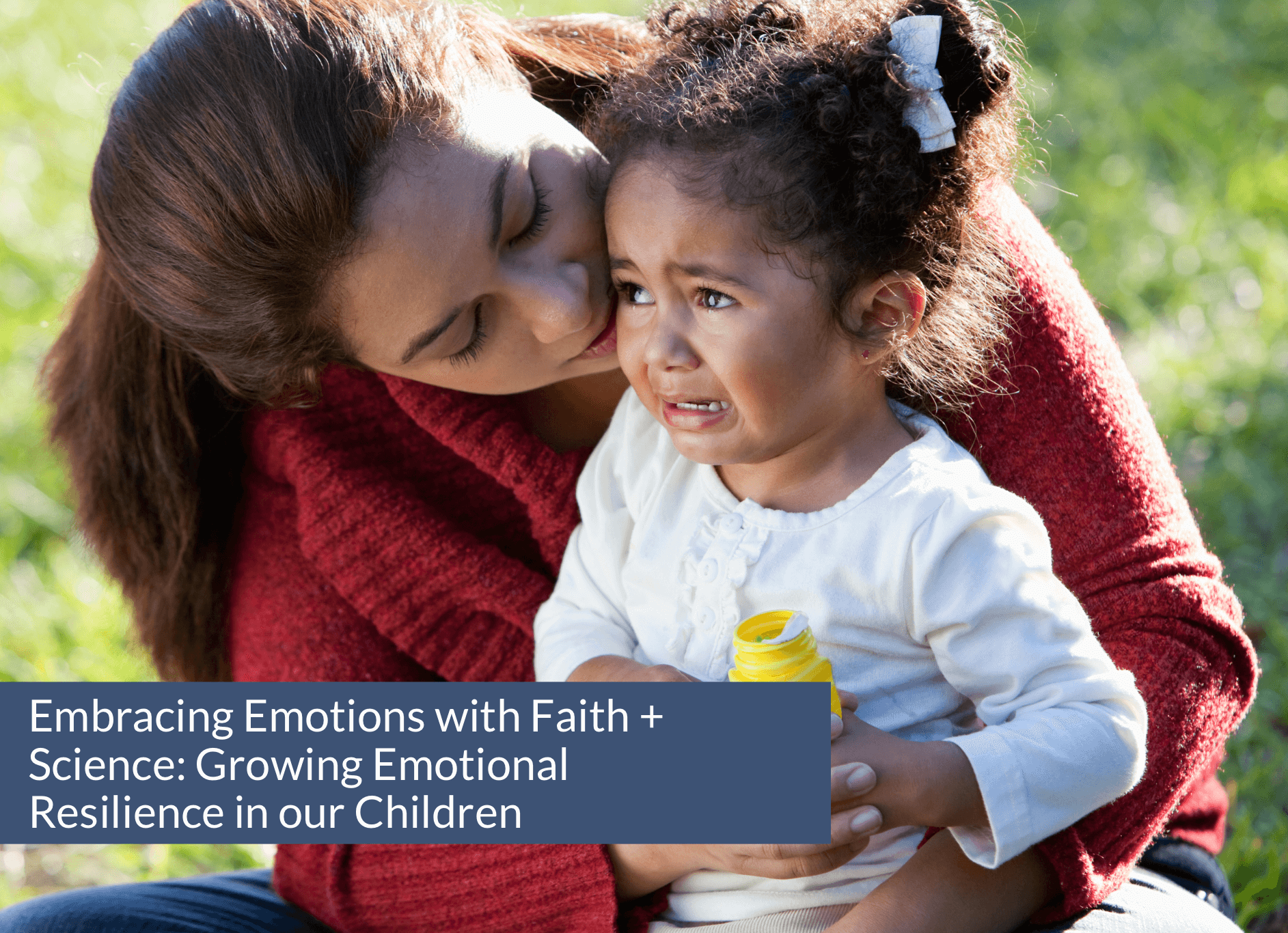
When it comes to helping our children understand and navigate their emotions, we have both timeless wisdom and truth from Scripture and modern insights from neuroscience to guide us as parents and caregivers. By looking to Jesus as our example and understanding how emotions work in the brain, we can offer our kids the support they need to develop healthy emotional resilience.
JESUS AS OUR MODEL FOR RESPONDING TO EMOTIONS
One of the most powerful examples of responding to emotions in Scripture is found in John 11, where Jesus grieves alongside Mary and Martha at the death of their brother, Lazarus. Both sisters approach Jesus with sorrow and a sense of blame: “Lord, if you had been here, my brother would not have died.”
Despite knowing He would raise Lazarus from the dead, Jesus didn’t rush to “fix” their grief or offer a lecture on faith. He didn't quote Scripture verses, try to help them understand the bigger picture, or tell them "feelings aren't facts."
Instead, He wept with them.
The Greek language used in this passage shows a profound intensity—Jesus was “deeply moved in spirit and troubled.” More literally, the greek language implies that he "shook with intense emotion." He felt the weight of their pain, joining them in their grief rather than correcting their misapplied blame or limited perspective.
For us as parents, Jesus’ response here is a model. Our children may experience big emotions that, from our perspective, seem disproportionate or based on a limited understanding. But Jesus shows us the power of compassionate presence, honoring emotions rather than dismissing or correcting them immediately.
While Scripture doesn’t articulate exactly why He chose meet them in the depths of their grief, modern neuroscience gives us a possible reason. We know from learning about the brain (where emotions and emotional resilience develop) that emotional resilience is built by being in the presence of a nurturing, trustworthy person who validates and supports us through the emotional storm.
Jesus knew that Mary and Martha would face grief again. Beyond the miracle of raising Lazarus, He taught them a profound truth: it’s okay to grieve. He offered them a hope that prepared them for their earthly lives, and His presence assured them that they were not alone in their sadness.
In John 11 we see a profound, hope-filled spiritual truth: Jesus is the resurrection and the life (John 11:25). And there is a neurobiological truth as well: Joining them in their grief built resilience and offered emotional strength to face earthly losses again.
EMOTIONS ARE SIGNALS, NOT THE STEERING WHEEL
One helpful concept from neuroscience is that emotions act like dashboard signals, letting us know there’s something deeper happening. Emotions are there to alert us to needs, whether for comfort, connection, or nourishment, a need to rest, or an immediate need for co-regulation or self-regulation. When we treat emotions as signals rather than steering wheels, we can guide our children in recognizing feelings without letting those feelings drive their actions.
By helping our children see emotions as important information rather than truth itself, we offer a foundation of self-awareness. If your child feels anxious, for example, we can help them identify that feeling and ask, “What is this emotion trying to tell us? Is it a need for reassurance or for rest?” Like Jesus did, we can come alongside them, honoring the feeling before attempting to explain or redirect it.
A good analogy for this is the low tire pressure on your car's dashboard. There are a variety of reasons this light might come on:
- Temperature Changes
- Small leak
- Valve damage
- Flat tire due to a nail, screw or other minor object
- Underinflated or overinflated
- An electrical or computer glitch
- A faulty sensor
- Wheel damage
The tire pressure light gives important, yet incomplete information. Yet, if you're going to care for your car well, and get where you want to go, paying attention to that tiny signal is crucial!
That's how emotions are: they give us important information and we need to pay attention to them (rather than ignore them), and dig a little deeper to understand what needs need to be addressed. But just like you can't figure out what's going on with your tire until your car stops, our children can't really learn the important lessons about emotional resilience until they're regulated (or the emotional storm has stopped.)
WHY VALIDATING EMOTIONS MATTERS: INSIGHTS FROM MODERN NEUROSCIENCE
Current research shows that emotional resilience develops when children experience empathy and co-regulation from a nurturing adult. Neuroscientists have found that when a trusted person helps a child process emotions, it supports the development of the brain’s “resilient pathways.” These pathways strengthen the child’s ability to manage future stress, frustration, and even disappointment!
Think of it like this, when a toddler experiences disappointment because their preferred sippy cup isn't available, and their parent or caregivers supports them through that disappointment, meets their need for emotional connection, any physical needs that may be influencing the strong response, and helps them recognize that they made it through that disappointment safely and securely, that toddler begins to develop resilience for disappointment.
Over time, this grows into experiencing and growing resilience for disappointment because they didn't get selected for the soccer team, disappointment because no one showed up to their birthday party, and later in adolescence, disappointment over broken relationships, and other emotional struggles that are common to all of us.
When children are validated in moments of strong emotion, they learn over time that while their emotions may be intense, they are manageable and something they can handle. Jesus’ compassionate response to Mary and Martha mirrors this idea beautifully: He showed them that it was okay to grieve even though there was hope of the resurrection. This experience of shared grief likely reinforced their resilience for future losses.
And if you’re looking for more resources, our book, The Flourishing Family provides practical ways to bring Jesus-centered, neuroscience-backed parenting into your home.













0 Comments